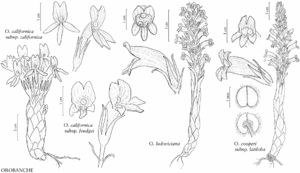familyOrobanchaceae
genusOrobanche
speciesOrobanche cooperi
subspeciesOrobanche cooperi subsp. latiloba
Difference between revisions of "Orobanche cooperi subsp. latiloba"
Phytoneuron 2015-48: 15. 2015.
Illustrated
Basionym: Orobanche ludoviciana var. latiloba Munz Bull. Torrey Bot. Club 57: 621, plate 39, fig. 18. 1931
Synonyms: Aphyllon cooperi subsp. latilobum (Munz) A. C. Schneider O. multicaulis Brandegee
imported>Volume Importer |
imported>Volume Importer |
||
| Line 63: | Line 63: | ||
|publication year=2015 | |publication year=2015 | ||
|special status=Illustrated | |special status=Illustrated | ||
| − | |source xml=https:// | + | |source xml=https://bitbucket.org/aafc-mbb/fna-data-curation/src/2e0870ddd59836b60bcf96646a41e87ea5a5943a/coarse_grained_fna_xml/V17/V17_825.xml |
|genus=Orobanche | |genus=Orobanche | ||
|species=Orobanche cooperi | |species=Orobanche cooperi | ||
Latest revision as of 19:37, 5 November 2020
Plants usually branched, base usually enlarged. Leaves rarely imbricate proximally; blade broadly lanceolate, 8–12 mm, apex obtuse. Inflorescences: bracts 7–11 mm, apex acuminate or obtuse, sometimes slightly reflexed. Corollas 22–32 mm; palatal folds densely villous; abaxial lip 5–9 mm, adaxial lip erect or reflexed, 6–10 mm, lobes with apiculate tooth. Anthers pubescent, stalked glands present on dorsal surface, rarely absent. Stigmas bilaminar-rhomboid, sometimes peltate or crateriform. 2n = 48, 96.
Phenology: Flowering Jan–Apr.
Habitat: Warm sandy deserts and dry washes of Sonoran Desert.
Elevation: -50–1000 m.
Distribution
Ariz., Calif., Nev., Mexico (Baja California, Baja California Sur, Sonora).
Discussion
Selected References
None.
Lower Taxa
None.
